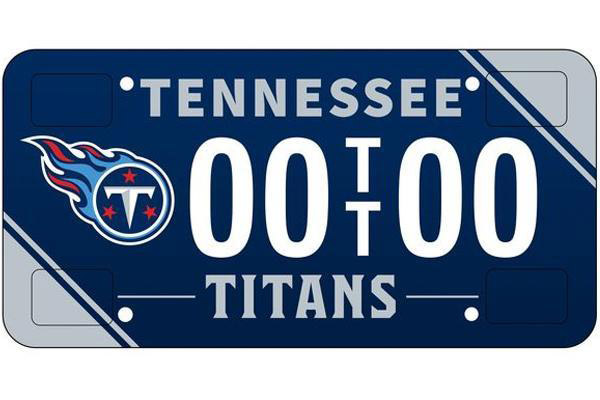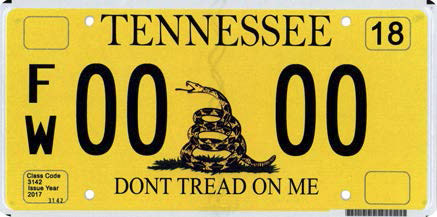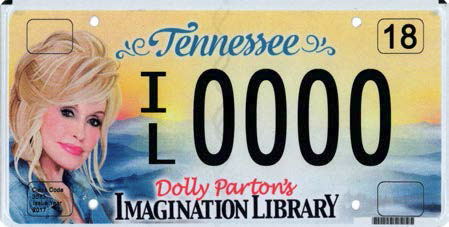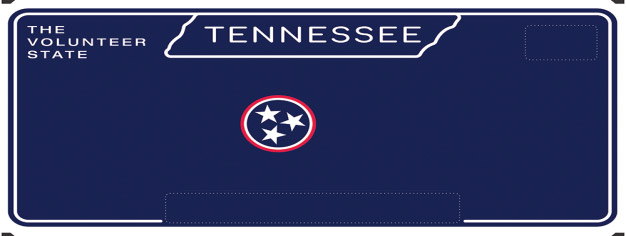 What Is a License Plate Reader and Can Police Track You Using It?
What Is a License Plate Reader and Can Police Track You Using It?
Table of Contents
- Tennessee License Plates
- Tennessee License Plate Design and Formats
- Tennessee Vanity License Plate
- Most Popular Tennessee Special Plate Numbers
- Tennessee License Plate Lookup
- What Do I Need to Get a License Plate in Tennessee?
- Differences Between a Passenger License Plate and a Commercial License Plate in Tennessee
- How to Renew License Plate in Tennessee
- How to Transfer a License Plate in Tennessee
- Tennessee License Plate Lookup Frequently Asked Questions (FAQ)
 Tennessee License Plates
Tennessee License Plates
Tennessee license plates are metallic plates assigned to motor vehicles registered in the state. These license plates (sometimes called registration plates or tags) are issued by the Tennessee Department of Revenue (DOR), and their primary purpose is to identify the vehicle and its registered owner. To this end, each license plate displays a unique alphanumeric combination (the license plate number) that links the vehicle to its owner and facilitates its swift and effective identification, whether for administrative, law enforcement, or compliance purposes.
Per Section 55-4-110 of the Tennessee Code, every vehicle that operates within the state, such as passenger cars, trucks, vans, motorcycles, trailers, and RVs, must display a valid license plate. The license plate must be securely attached to the rear of the vehicle at least 12 inches off the ground and kept clean and visible at all times. However, truck tractors (and other similar vehicle types) typically display their plates in the front.
The Tennessee Department of Revenues offers four main kinds of license plates:
- Regular License Plates: these are the standard plates the department issues. They are typically available to all vehicle registrants.
- Specialty License Plates: these plates feature unique designs and colors representing various organizations, causes, and interests. Subcategories of this plate type include collegiate, military, fraternity, environmental, special cause, and wildlife plates. The availability of some of these plates may be limited to individuals who meet specific criteria.
- Disabled Driver Plates: these are specifically issued to individuals who are disabled, have difficulty walking or seeing, or the parents and guardians of these individuals. The DOR may also issue a disabled placard to agencies transporting disabled people – this placard must only be used when carrying disabled clients.
- Personalized Plates: these are Tennessee license plates that display customized plate numbers, subject to the department's guidelines. This option is available on request for most plates issued by the DOR.
Be aware that the DOR typically issues decals indicating the month and year of your vehicle's registration expiration (and, by extension, your license plate's validity period) and your county of residence along with the license plate. These decals should be affixed to the designated areas on the plate – usually the upper right corner for the registration decal and the bottom center for the county decal.
 Tennessee License Plate Design and Formats
Tennessee License Plate Design and Formats
Regular Tennessee license plates assigned to passenger automobiles have a simple and distinct design that consists of a seven-character license plate number screened in white on a reflective blue background with an emblem of the state's flag as a separator. The word "TENNESSEE" is screened in white inside an outlined state map at the top of the plate, with "THE VOLUNTEER STATE" also screened in white to the left of this (the upper left corner of the plate). In late 2023, the state introduced a variation to its regular plates that added the phrase "IN GOD WE TRUST", screened in white above the area designated for the county decal. "In God We Trust" plates became available in January 2024, and vehicle owners are typically given a choice between these plates and regular plates without the "In God We Trust" phrase when requesting new license plates.
Note that this design and format may vary for regular plates issued for motorcycles and nonpassenger vehicles. Similarly, specialty, disabled, and personalized plates also typically feature logos and background designs that reflect the specific cause or organization they represent.
Here are examples of Tennessee license plate designs:
Regular License Plates (Automobiles):


Specialty License Plates:



* Source: Tennessee Department of Revenue
 Tennessee Vanity License Plate
Tennessee Vanity License Plate
The Tennessee Department of Revenue allows vehicle owners to personalize their license plates by choosing the combination of letters and numbers that appear on the plate themselves instead of being assigned a plate number (by the DOR). Personalization options are typically available for most of the plates the department offers. These personalized plates are generally available for several vehicle types, including passenger automobiles, motorcycles, and trucks – they allow vehicle owners to add a touch of individuality and express personal messages or opinions through their vehicles.
You can order personalized Tennessee license plates online via the DOR's website or by visiting your County Clerk's office and filling out an application form. You can also check the availability of your desired combination via the website or at the County Clerk's office – the department typically allows applicants to provide up to three variations for their desired personalization. Be aware that your desired customization must comply with certain guidelines, such as:
- Must be between three to five characters (some plate types allow for up to seven characters)
- It must start with a character
- It cannot contain special characters or emojis
- Must not conflict with or duplicate any plate numbers already issued or being issued by the DOR
- Must not be offensive or inappropriate
You will be charged a $35 personalization fee for your vanity plates, due at the time of application, when you order your personalized plates. Additional costs may be incurred depending on the type of plate you wish to customize; these fees are usually collected by the County Clerk's office when you pick up your plates. Processing and delivery times typically depend on the department's workload and your location. Be aware that you will be charged an annual fee to maintain your customized plate number. Contact the DOR at (888) 871-3171 for inquiries on personalized plate fees and delivery timelines. Queries can also be directed to your local County Clerk's office.
 Most Popular Tennessee Special Plate Numbers
Most Popular Tennessee Special Plate Numbers
The Tennessee Department of Revenue offers more than 100 specialty license plates across various categories, including military, collegiate, club, environmental, sports, and special causes. Here are some of the most common specialty plates ordered by vehicle owners in the state:
- Don't Tread on Me plates
- Friends of the Smokies plates
- American Eagle Foundation plates
- Agriculture plates
- Fish and Wildlife Species – Bear plates
- Dollywood Foundation plates
- Save the Bees plates
- St. Jude Children's Research Hospital plates
- Tennessee Titans plates
- Tennessee Arts Commission – Cool Cat plates
 Tennessee License Plate Lookup
Tennessee License Plate Lookup
A license plate lookup is a method for obtaining vehicle-related information using the vehicle's license plate number. These lookups typically offer details like the vehicle's make, model, year, and registration history. They may also include information on repairs and rebuilds, like the vehicle's accident history, odometer readings, and maintenance records.
License plate lookups are typically used for several reasons, such as verifying registration status before purchase. They are also used to identify vehicles involved in accidents and aid in investigating stolen or suspicious vehicles.
You can contact the Tennessee Department of Revenue at (888) 871-3171 to access vehicle information in its database. You will usually be required to submit a written request indicating the type of information you need and your intended use for this information.
Alternatively, you can obtain information on Tennessee-registered vehicles using third-party websites like RecordsFinder to perform reverse license plate number searches. These websites typically offer basic vehicle information; however, you may be required to pay a nominal fee for a more comprehensive vehicle report. Be aware that these websites are also bound by federal and state regulations concerning the release of vehicle owners' personal information.
Tennessee Reverse License Plate Number Search
The terms "license plate lookup" and "reverse license plate number search" are often used interchangeably; they are both processes through which you can obtain vehicle-related information. However, these processes retrieve this information through slightly different methods. License plate lookups use a plate number to access information, while reverse license plate number searches use partial vehicle information, like the car's make and model, to retrieve more information, including a list of associated plate numbers.
You can perform reverse license plate number searches on RecordsFinder and similar websites. However, it is important to note that federal and state regulations restrict the information these websites may provide users (these restrictions typically pertain to a vehicle owner's personal information, like their name or address).
 What Do I Need to Get a License Plate in Tennessee?
What Do I Need to Get a License Plate in Tennessee?
To get a license plate in Tennessee, you must first title and register your vehicle with the state's Department of Revenue – this department also oversees the issuance of license plates to appropriately registered vehicles. The vehicle titling and registration process is done locally at County Clerk's offices. You will typically need to submit the following documents to register your vehicle in Tennessee:
- A valid and properly assigned certificate of title, with an Odometer Disclosure Statement (where applicable)
- Bill of Sale
- Manufacturer's Statement of Origin (for new vehicles)
- Current out-of-state registration or out-of-state title if the former is not available (for new residents and individuals relocating to Tennessee)
- A valid and acceptable proof of ID
- Any additional documentation the County Clerk's office deems necessary
Registration costs are typically determined by your vehicle type, declared value, and applicable taxes. Your County Clerk's office will issue you a license plate after it processes your registration application; this processing time is usually influenced by the correctness of your submission and the office's workload at the time of the application. Note that, while registration applications are typically done in person, some counties may offer additional options for submitting requested registration documents and fees. As such, we recommend contacting your local County Clerk to get specific information on its vehicle registration and license plate issuance process and requirements.
General inquiries on vehicle titling, registration, and license plate issuance can also be directed to the state's Department of Revenue at (888) 871-3171.
 Differences Between a Passenger License Plate and a Commercial License Plate in Tennessee
Differences Between a Passenger License Plate and a Commercial License Plate in Tennessee
Under state law, any vehicle used to transport passengers or property in exchange for compensation is considered a commercial motor vehicle if it meets any of the following criteria:
- Has a gross vehicle weight or gross combination weight of 26,001 pounds or more
- Is designed for over 15 passengers, including the driver
- Is used to transport hazardous material, regardless of its size or weight class
However, certain vehicles are exempt from this classification. This includes vehicles used by farmers for agricultural purposes, emergency vehicles, military vehicles, recreational vehicles, and vehicles leased for personal use.
The Tennessee Department of Revenue typically assigns these commercial motor vehicles specific license plates that indicate their vehicle type or classification. On the other hand, vehicles like cars, vans, and SUVs designed for personal use and transportation (commonly referred to as passenger vehicles) are typically assigned regular license plates. These vehicles may also be issued specialty, personalized, and disabled driver plates.
The table below outlines the key differences between passenger license plates and commercial license plates (and the vehicles they are assigned to) in Tennessee:
| Features | Passenger License Plate | Commercial License Plate |
|---|---|---|
| Vehicle Use | Personal use | Commercial use |
| Plate number arrangement |
Seven-character alphanumeric serial format for standard plates: "ABC-1234" and "123-ABCD" (for the In God We Trust version) * specialty, personalized, and disabled driver plates may have plate numbers with less than seven characters |
Plate number is typically coded to indicate the vehicle type |
| Design & Color |
White lettering over a blue background with the state flag as a separator for the plate number. "TENNESSEE" is screened inside an outlined state map at the top of the plate, with "THE VOLUNTEER STATE" screened to the left of this (the upper left corner of the plate). "IN GOD WE TRUST" is screened in white above the area designated for the county decal for the In God We Trust plates. * this design is for standard plates. Other plate types may vary from this |
Black lettering over a white background with the vehicle type indicated at the bottom of the plate. * variations may occur for different vehicle types |
| Vehicle Types | Cars, SUVs, vans, personal trucks, and vehicles that weigh less than 26,001 lbs | Vehicles weighing 26,000 lbs or more, designed to carry more than 15 passengers, or transport hazardous waste (regardless of its size and weight) |
| Requirements for obtaining |
|
Same as passenger license plates |
 How to Renew License Plate in Tennessee
How to Renew License Plate in Tennessee
You must renew your vehicle registration with the Tennessee Department of Revenue annually to revalidate your license plates. Your vehicle's registration expires on the last day of your 12-month registration period (this month is indicated on the decal issued along with your license plate and for every subsequent registration renewal). However, the department allows registrants to renew their plates up to 90 days before this date. Note that even though the DOR typically sends renewal notice postcards, you are obligated to renew your registration before it expires, even if you don't receive one.
Registration (and license plate) renewals can be done via any of the following methods:
- Renewing in person at your local County Clerk's office. You will need to visit this office with either your renewal notice or current registration.
- Mailing the renewal notice and applicable fees to your County Clerk's office. Instructions for mail-in renewals are typically included in the renewal notice
- Online renewals. This option is usually available for passenger vehicles, motorcycles, trailers, and certain commercial vehicles. Note that you may be unable to utilize this option if your vehicle was registered in a different county the previous year or requires proof of eligibility or financial membership
- Using a self-service kiosk located in various locations across the state. Registrations and renewal decals can be printed from the kiosk after a successful renewal. Note that this option is only available for participating counties. You will need your current registration or driver's license to utilize this option. Your vehicle emission inspection and proof of insurance must also be on file with the department, where applicable
- Via the DOR's Auto Assistant app, which you can download from smartphone app stores. Note that this option may not be available for some counties
Renewal fees vary based on vehicle type, plate type, and renewal method. In-person and kiosk renewals are typically processed instantly, while online and mail-in renewals are typically processed and delivered within 5 – 10 business days.
 How to Transfer a License Plate in Tennessee
How to Transfer a License Plate in Tennessee
The Tennessee Department of Revenue permits the transfer of license plates between vehicles registered to the same owner. These transfers are typically handled locally by county clerks and usually cost $1. Nonetheless, contact your county clerk's office for specific details on the documentation required to transfer your plates. Be aware that transferring Tennessee license plates between vehicles before appropriately informing the DOR through your county clerk is considered a class A misdemeanor, punishable by fines of up to $2,500, jail time of up to 11 months, or both.
 Tennessee License Plate Lookup Frequently Asked Questions (FAQ)
Tennessee License Plate Lookup Frequently Asked Questions (FAQ)
Can I Get a Replacement for My Lost License Plate in Tennessee?
The Tennessee Department of Revenue issues replacement license plates and decals for lost or stolen plates. You can obtain a replacement plate or decal by submitting an Application for Duplicate/Replacement License Plate or Decal to your county clerk's office. You will typically have to include a police report for lost or stolen plates (this is not usually required for replacing decals only). Note that your county clerk may request additional documentation. Replacement plates cost $10; you may also have to pay additional county fees.
What Do Police See When They Run Your License Plates in Tennessee?
Law enforcement officials in Tennessee can usually access the following information when they run license plates:
- The vehicle's make, model, and year
- The vehicle's registration status and registered owner
- The registered owner's name, address, and photograph
- Any suspensions placed on the vehicle
- Alerts, BOLOs, outstanding warrants, and any other violations of the law connected to the vehicle and its registered owner
What Is the Penalty for Driving with an Expired License Plate in Tennessee?
Tennessee license plates must be renewed annually by the last day of the vehicle's 12-month registration period. The Department of Revenue usually sends renewal notices before this date; nevertheless, it's on you to ensure that your vehicle's registration is renewed before the due date. Driving with expired license plates is against the law. The penalty for this offense typically involves a fine, which can vary depending on factors like how long the plates have expired, whether it's a first-time offense or a repeat violation, and your location.
Do I Need to Return License Plates in Tennessee?
Tennessee license plates typically follow the owner and not the vehicle; as such, you can keep your plate when you dispose of your vehicle. However, destroying the plate if your vehicle registration has not expired is advisable to avoid it falling into the wrong hands and being misused (considering that the plate is still linked to you). Be aware that you will typically be required to surrender specialty or personalized plates to the Department of Revenue (through your county clerk's office) when renewing your registration if you no longer meet the eligibility criteria for the plate or no longer want the plate.
Can I Keep My Tennessee License Plate If I Move to Another State?
You can choose to keep or dispose of your Tennessee license plate when you move to a new state. It is advisable to properly destroy the plate to avoid it being reused if you decide to dispose of it. The Tennessee Department of Revenue is usually notified when you register your vehicle in another state and will subsequently cancel your Tennessee registration.
What Size Are License Plates in Tennessee?
Tennessee license plates usually adhere to the standard dimensions of 12 inches x 6 inches for passenger vehicles and 7 inches x 4 inches for motorcycles, which are implemented by most states nationwide.
How Long Can You Drive with Temporary License Plates in Tennessee?
The Tennessee Department of Revenue typically issues temporary operation permits under specific circumstances, such as when a vehicle owner has issues titling and registering their vehicle. These temporary operation permits (red tags) are usually valid for up to 30 days and can be obtained from county clerk's offices. Note that a vehicle cannot be issued more than five temporary permits per year. The DOR may also authorize the issuance of temporary disabled placards to individuals with a temporary disabling condition; this placard is valid for up to six months and may be renewed once.
Driving with an expired temporary operation permit is a class C misdemeanor, punishable by fines of up to $50, jail time of up to 30 days, or a combination of both. The vehicle will also be impounded until it has been appropriately registered.
What Are the Steps to Renew a License Plate in Tennessee?
You can renew your Tennessee license plate by taking the following steps:
- Determine your renewal due date. Tennessee plates are due for renewal by the last day of a 12-month registration period and can be renewed up to 90 days before this date. The state's Department of Revenue typically sends a renewal notice postcard before your renewal date
- Choose your preferred renewal method. Options include in-person renewals at your county clerk's office or self-service kiosk, online renewals, mail-in renewals, and renewals via the DOR's Auto Assistant app
- Submit required documents and pay stipulated fees
- Receive new registration and decals
- Affix decals to designated areas on your license plate
What Do I Do If My License Plate Is Lost or Stolen in Tennessee?
You should take the following steps if your Tennessee license plate is lost or stolen:
- File a report with your local law enforcement agency
- Contact your county clerk's office to determine the necessary documentation and replacement fees. These usually include an Application for Duplicate/Replacement License Plate or Decal, a police report, and proof of vehicle ownership
- Submit required documents and fees
- Receive a new or duplicate plate and decal
 Related Articles
Related Articles
The information on this website is taken from records made available by state and local law enforcement departments, courts, city and town halls, and other public and private sources. You may be shocked by the information found in your search reports. Please search responsibly.
Recordsfinder.com is not a “consumer reporting agency” and does not supply “consumer reports” as those terms are defined by the Fair Credit Reporting Act (FCRA). Pursuant to our Terms of Service and Privacy Policy, you acknowledge and agree not to use any information gathered through Recordsfinder.com for any purpose under the FCRA, including but not limited to evaluating eligibility for personal credit, insurance, employment, or tenancy.
Searches of license plate and VIN information are available only for purposes authorized by the Driver’s Privacy Protection Act of 1994 (DPPA).
By clicking “I Agree” you consent to our Terms of Service, agree not to use the information provided by Recordsfinder.com for any unlawful purposes, and you understand that we cannot confirm that information provided below is accurate or complete.
The search you are about to conduct on this website is a people search to find initial results of the search subject. You understand that any search reports offered from this website will only be generated with the purchase of the report or account registration.



